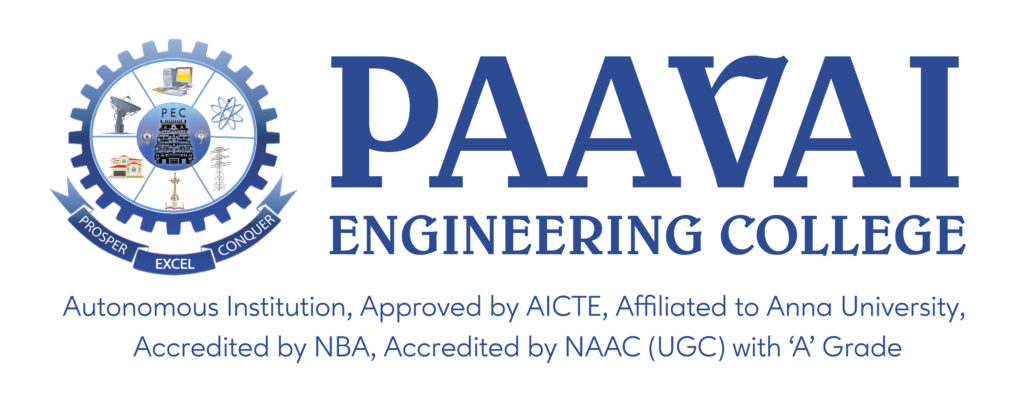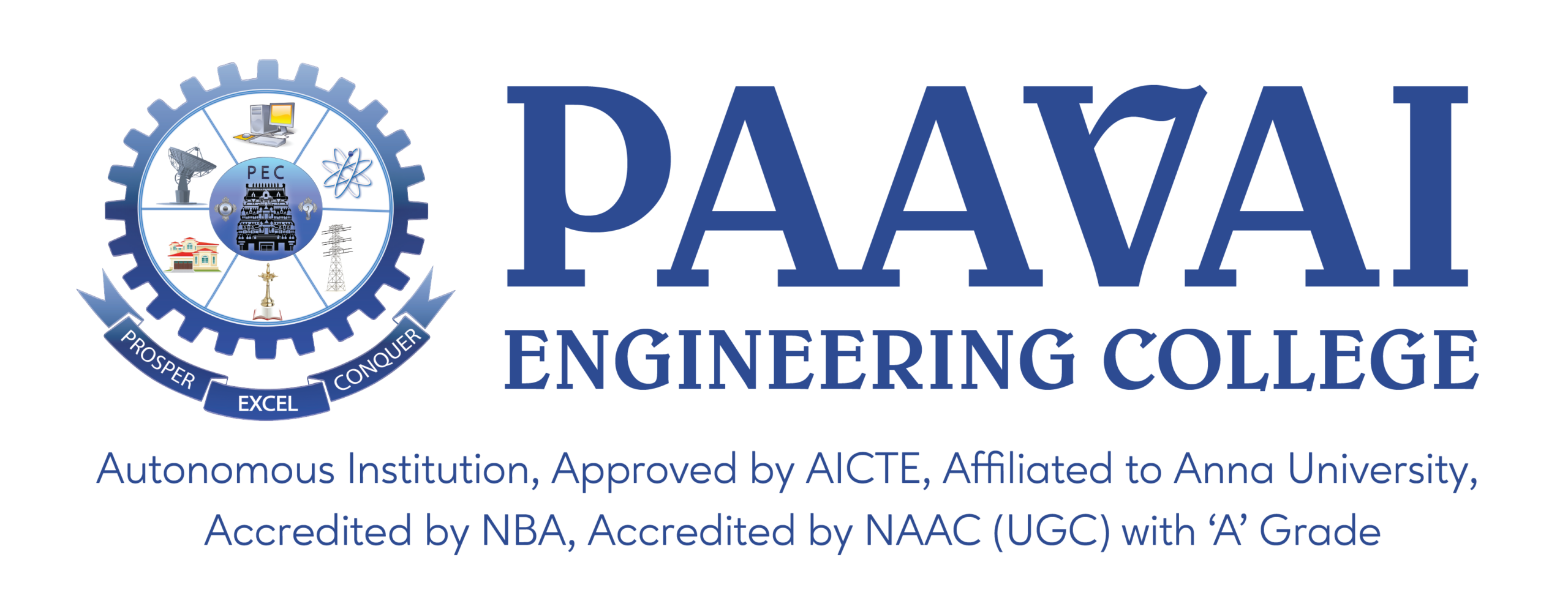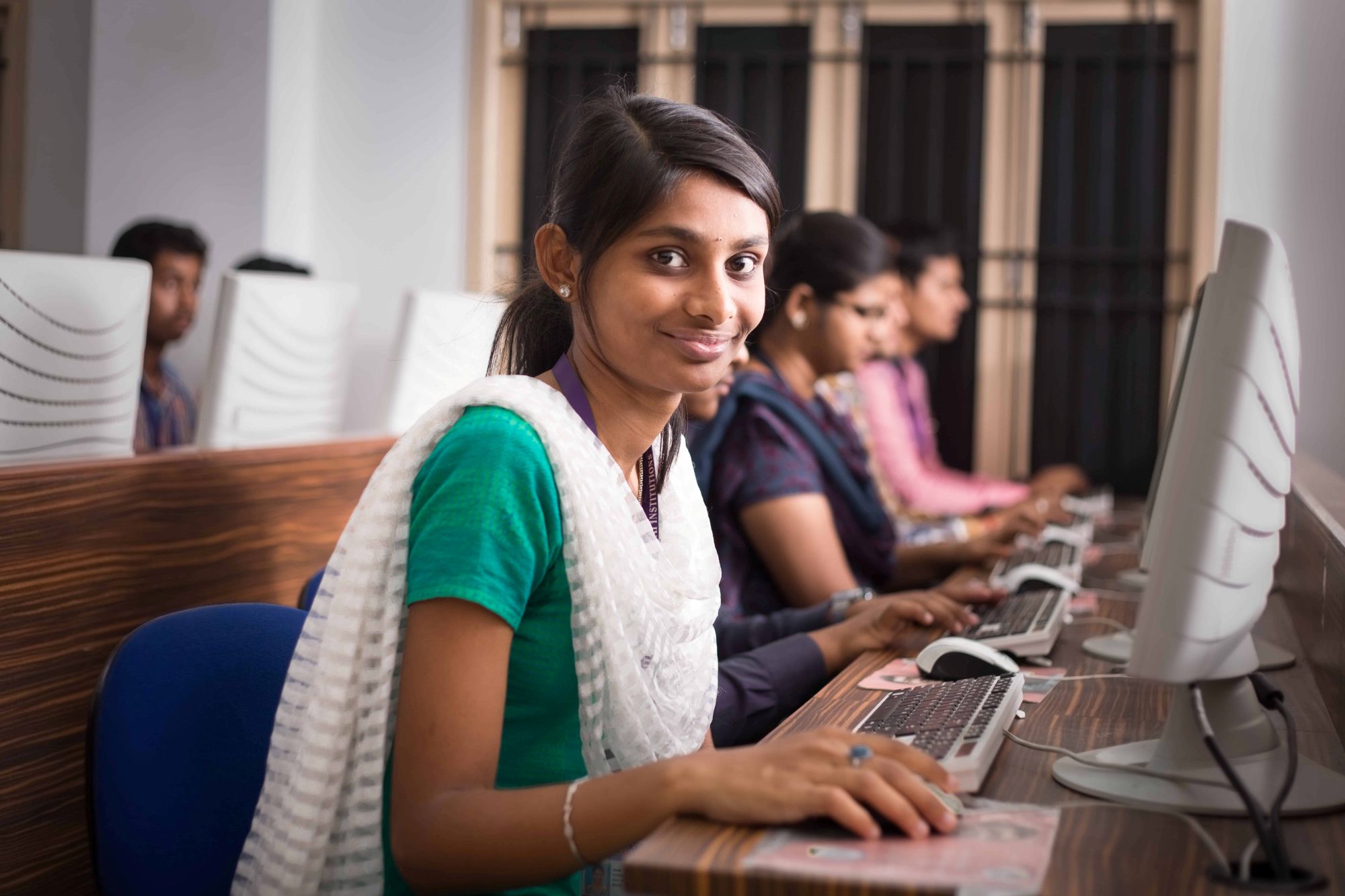-
About the Department
-
Vision and Mission
-
PEOs, POs, and PSOs
-
Faculty Information
-
Laboratory Facility
-
Department Library
About the Department
The Department of IoT at Paavai Engineering College is a leading educational institution that focuses on the study, research, and application of the Internet of Things. Our department offers comprehensive programs and resources to equip students with the knowledge and skills required to excel in this rapidly evolving field. With a team of experienced faculty, state-of-the-art facilities, and industry partnerships, we strive to provide a stimulating and nurturing environment for students to explore the potential of IoT and contribute to its advancements.
The Department of IoT is committed to fostering research and innovation in the field of IoT. Our faculty members are actively engaged in research projects and collaborate with industry partners to address real-world challenges. Areas of research focus include smart cities, industrial IoT, healthcare applications, agriculture automation, and energy management. Students have the opportunity to participate in research initiatives and work alongside faculty members, gaining valuable experience in solving complex problems.
We provide state-of-the-art facilities and infrastructure to support the learning and research needs of our students. Our IoT lab is equipped with the latest hardware and software tools, including development boards, sensors, actuators, and IoT platforms. Students have access to high-speed internet, cloud computing resources, and simulation software for prototyping and testing IoT applications. Additionally, we have dedicated spaces for project development, seminars, and collaborative work.
The Department of IoT maintains strong ties with industry leaders, startups, and research organizations in the IoT domain. These collaborations enable students to engage in industry-relevant projects, internships, and networking opportunities. We regularly organize guest lectures, workshops, and hackathons in partnership with industry experts, allowing students to gain insights into emerging trends and technologies.
Vision and Mission
Vision
To provide cutting-edge education in Computer Science and Engineering (Internet of Things), empowering students with strong technical expertise, innovation thinking, and ethical values to develop intelligent solutions that address global challenges and benefit society.
Mission
- Quality Education: To deliver a high-quality, outcome-based program in Computer Science and Engineering (IoT), ensuring students gain a strong theoretical foundation and practical skills.
- Technology Updation: To frequently update the curriculum and learning resources in line with advancements in Computer Science and Engineering with Internet of Things.
- Employability: To improve students’ employability by providing them with industry-relevant training, internships, certifications, and opportunities to build their skills through Industry-Institution relationship and make them industry ready.
- Research & Development: To promote research & innovation in IoT related domains and encouraging students and faculty members to involve in research and development initiatives.
PEOs, POs, and PSOs
Programme Educational Objectives (PEOs) |
|
| PEO1 | Global reputation: To establish successful careers in industry, academia, or entrepreneurship by applying their technical knowledge and professional skills in diverse global environments. |
| PEO2 | Fundamental Knowledge: To apply analytical thinking and engineering fundamentals to model, analyze, and develop efficient solutions for real-world challenges. |
| PEO3 | Continuous Learning: To follow lifelong learning and continuously enhance their knowledge and skills by adapting to emerging trends and technologies in Computer Science and Engineering with specialization of Internet of Things. |
Programme Outcomes (pos) Engineering Graduates will be able to: |
|
| PO1 | Engineering Knowledge: Apply knowledge of mathematics, natural science, computing, engineering fundamentals and an engineering specialization as specified in WK1 to WK4 respectively to develop to the solution of complex engineering problems. |
| PO2 | Problem Analysis: Identify, formulate, review research literature and analyze complex engineering problems reaching substantiated conclusions with consideration for sustainable development. (WK1 to WK4) |
| PO3 | Design/Development of Solutions: Design creative solutions for complex engineering problems and design/develop systems/components/processes to meet identified needs with consideration for the public health and safety, whole-life cost, net zero carbon, culture, society and environment as required. (WK5) |
| PO4 | Conduct Investigations of Complex Problems: Conduct investigations of complex engineering problems using research-based knowledge including design of experiments, modelling, analysis & interpretation of data to provide valid conclusions. (WK8). |
| PO5 | Engineering Tool Usage: Create, select and apply appropriate techniques, resources and modern engineering & IT tools, including prediction and modelling recognizing their limitations to solve complex engineering problems. (WK2 and WK6) |
| PO6 | The Engineer and The World: Analyze and evaluate societal and environmental aspects while solving complex engineering problems for its impact on sustainability with reference to economy, health, safety, legal framework, culture and environment. (WK1, WK5, and WK7). |
| PO7 | Ethics: Apply ethical principles and commit to professional ethics, human values, diversity and inclusion; adhere to national & international laws. (WK9) |
| PO8 | Individual and Collaborative Team work: Function effectively as an individual, and as a member or leader in diverse/multi-disciplinary teams. |
| PO9 | Communication: Communicate effectively and inclusively within the engineering community and society at large, such as being able to comprehend and write effective reports and design documentation, make effective presentations considering cultural, language, and learning differences |
| PO10 | Project Management and Finance: Apply knowledge and understanding of engineering management principles and economic decision-making and apply these to one’s own work, as a member and leader in a team, and to manage projects and in multidisciplinary environments. |
| PO11 | Life-Long Learning: Recognize the need for, and have the preparation and ability for i) independent and life-long learning ii) adaptability to new and emerging technologies and iii) critical thinking in the broadest context of technological change. (WK8) |
Programme Specific Outcomes (PSOs) |
|
| PSO1 | Foundation of Computer System and Software Development: Able to design, develop, test, and maintain reliable software applications by applying software engineering principles, modern programming languages, and development tools to address user and industry needs. |
| PSO2 | Applications of Computing and Research Ability: Able to show their potential, intensive knowledge and carry out research, evaluate challenging issues, and create solutions with the use of contemporary tools and methods, recent trends in Computer Science and Engineering with Internet of Things. |
Faculty Information
| S.No | Faculty Name | Designation | Qualification |
| 1 | Mr.S.Sathish | Associate Professor | M.E., |
| 2 | Dr.R.Sivakumar | Assistant Professor | M.E.,Ph.D |
| 3 | Mr.M.Nijanthan | Assistant Professor | M.Tech., |
| 4 | Mr.M.Chitrasankar | Assistant Professor | M.E., |
| 5 | Mr.S.Bharaneedharan | Assistant Professor | M.E., |
| 6 | Ms.D.Kanagavalli | Assistant Professor | M.E., |
| 7 | Ms.G.Baby Sarala | Assistant Professor | M.E., |
| 8 | Ms.M.Mangaiyarkarasi | Assistant Professor | M.E., |
Laboratory Facility
| S.No | Name of the Lab | Name of the Equipment | Qty |
| 1 | IOT Lab | LDR Sensor | 10 |
| Stepper Motor | 10 | ||
| DC Motor | 10 | ||
| LCD Display 16 X 2 | 5 | ||
| LED Display 37 X 37 | 2 | ||
| LED bulb | 60 | ||
| Raspberry Pi Kit | 10 | ||
| Arduino Kit | 10 | ||
| Humidity Sensor | 10 | ||
| Piezoresistive Sensor | 10 | ||
| Temperature Sensor | 10 | ||
| Accelerometer Sensor | 10 | ||
| Flow Sensor | 10 | ||
| Flow and Level Sensor | 10 | ||
| Gas Sensor | 10 | ||
| Straingag Sensor | 10 | ||
| Quarts Sensor | 10 | ||
| Optical Sensor | 10 | ||
| Motion Sensor | 10 | ||
| Film Sensor | 10 | ||
| Proximity Sensor | 10 | ||
| 2 | AWS IoT Device Defender | 2 Kit | |
| 3 | 7 – segment Display | 10 | |
| Clock interfacing | 10 | ||
| ADC interfacing | 2 | ||
| DAC interfacing | 2 | ||
| LED Display 40 X 8 | 1 | ||
| 4 | i7 processor with 8 GB RAM | 10 | |
| 5 | TP Link Wireless Dual Band Router | 1 | |
| 6 | TP Link Wireless Dongle 300 mps | 10 |
Department Library
| S.No | Particulars | Quantity |
| 1 | No. of Volumes | 6050 |
| 2 | No. of Titles | 1164 |
| 3 | No. of Journals | 24 |
| 4 | No. of e-Books | 450 |
| 5 | No. of System with Internet Facility & IEEE Access | 01 |


